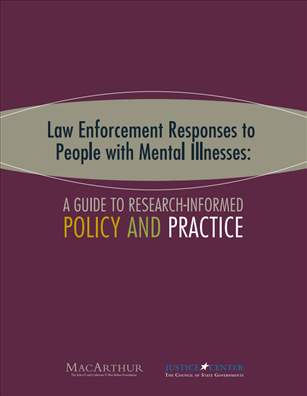Law Enforcement Responses to People with Mental Illnesses: A Guide to Research-Informed Policy and Practice
The complex nature of law enforcement responses to people with mental illnesses has become an issue of national concern. These calls for service are often time-consuming and difficult to resolve, and, on relatively rare occasions, result in tragic injuries or deaths. Policymakers, community leaders, and the public are demanding better outcomes from these encounters. In the face of this mounting pressure, and with a desire to improve their interactions with people with mental illnesses, law enforcement officers are turning to specialized responses. These efforts show great promise for increasing the safety of everyone involved and connecting individuals to needed mental health supports and services when appropriate. However, policymakers generally implement these programs without the benefit of research and data documenting the scope and nature of the problem in their community, the weakness of past response models, and the relative importance of specific program features. To ensure law enforcement policies and practices related to people with mental illnesses are data driven and well-informed, this guide summarizes the available research on law enforcement encounters with people with mental illnesses and strategies to improve these interactions.
Provider: Council of State Governments
Publication Date: 2009
